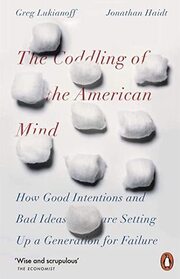Everyone jokes about Millennials - when actually think most times we are referring to iGen. We've all seen the memes . . ."Growing up I drank from a water hose, rode my bike 5 miles from home - without a helmet, and my parents didn't care where I was as long as I was home before the street lights came on." Aside from a brief dose of nostalgia for some of us the overall implication is that the current generation can't/does't/won't.
"The Coddling of the American Mind: How Good Intentions and Bad ideas are Setting Up a Generation for Failure" by Greg Lukianoff and Jonathan Haidt present data indicating that the iGen is the least prepared for adulthood in history - but it may not be their fault. We - the parents, the generations before, taught them to be the way they are. Noticing a substantial and thought provoking change in behavior patterns in college students beginning in 2013 freshmen, prompted the writers to dig in and investigate the phenomena - "safe spaces", "trigger warnings", words, thoughts or ideas as "traumatic", hurt feelings as "violence".
The book is divided into three sections: the first defines 3 fundamental 'untruths' that most younger people (and often older folks as well) believe in. Paradigms that define and focus their world view. Section 2 is numerous examples from around American colleges that illustrate the 'untruths'. This section also dips into how the world outside of 'college life' impacts the campus and vice-versa. Also touching out how attempting be diverse and inclusive has caused many colleges to become more homogeneous further amplfying the untruths. Section 3 presents six possible causes, as well as some suggestions for improvement.
Lukianoff and Haidt provide thoughtful considerations to quite a few things I've pondered during recent years as well as touched on a few I had not considered. Peanut bans in elementary schools? Driving your kids to school as opposed to walking or taking the bus? What happened to recess? What's with the increase in childhood and teen anxiety? or Suicide rate? Why are kids not interested in getting their drivers licenses?
Woven throughout the entire book is the explanation regarding the utilization of CBT - cognitive behavior therapy - for dealing with anxiety, stress, and cognitive perception disorders.
Great book! Easy to read with substantial references. Thoughtfully laid out with balanced, reasoned perspectives. [5/5]
"The Coddling of the American Mind: How Good Intentions and Bad ideas are Setting Up a Generation for Failure" by Greg Lukianoff and Jonathan Haidt present data indicating that the iGen is the least prepared for adulthood in history - but it may not be their fault. We - the parents, the generations before, taught them to be the way they are. Noticing a substantial and thought provoking change in behavior patterns in college students beginning in 2013 freshmen, prompted the writers to dig in and investigate the phenomena - "safe spaces", "trigger warnings", words, thoughts or ideas as "traumatic", hurt feelings as "violence".
The book is divided into three sections: the first defines 3 fundamental 'untruths' that most younger people (and often older folks as well) believe in. Paradigms that define and focus their world view. Section 2 is numerous examples from around American colleges that illustrate the 'untruths'. This section also dips into how the world outside of 'college life' impacts the campus and vice-versa. Also touching out how attempting be diverse and inclusive has caused many colleges to become more homogeneous further amplfying the untruths. Section 3 presents six possible causes, as well as some suggestions for improvement.
Lukianoff and Haidt provide thoughtful considerations to quite a few things I've pondered during recent years as well as touched on a few I had not considered. Peanut bans in elementary schools? Driving your kids to school as opposed to walking or taking the bus? What happened to recess? What's with the increase in childhood and teen anxiety? or Suicide rate? Why are kids not interested in getting their drivers licenses?
Woven throughout the entire book is the explanation regarding the utilization of CBT - cognitive behavior therapy - for dealing with anxiety, stress, and cognitive perception disorders.
Great book! Easy to read with substantial references. Thoughtfully laid out with balanced, reasoned perspectives. [5/5]




